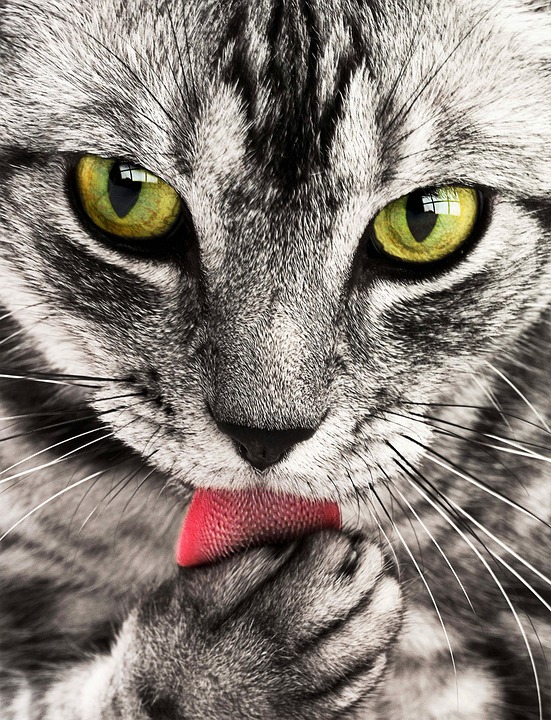Cats are known for their grooming habits, which involve licking themselves to keep their fur clean and tidy. However, excessive licking can sometimes indicate an underlying issue. In this article, we will delve into the science behind excessive licking in cats, exploring its causes and effects. Additionally, we will address frequently asked questions to provide you with a comprehensive understanding of this behavior.
Understanding Normal Cat Licking Behavior:
Grooming is an essential part of a cat’s daily routine. It helps them maintain a clean and healthy coat, remove dirt and debris, distribute natural oils, and stimulate blood flow. Cats use their tongues, which are covered in tiny, backward-facing barbs called papillae, to effectively clean themselves. These barbs help remove loose fur, dirt, and parasites, keeping their coats in optimal condition.
The duration and frequency of normal licking behavior vary among cats. Some cats may spend several hours a day grooming themselves, while others may spend less time. Additionally, the frequency may increase during shedding seasons or stressful periods.
Recognizing Excessive Licking:
Excessive licking refers to a behavior that goes beyond normal grooming habits. It is important to differentiate between normal grooming and excessive licking to identify potential underlying issues. Excessive licking is often characterized by persistent and intense licking, sometimes to the point of causing visible damage to the skin or fur.
Behavioral signs to look out for include obsessive licking in specific areas, such as the paws, abdomen, or tail. Cats may also exhibit signs of distress or discomfort, such as restlessness, vocalization, or changes in appetite or litter box habits.
Common Causes of Excessive Licking:
1. Skin Conditions:
– Allergies: Cats can develop allergies to certain types of food or environmental allergens, such as pollen or dust mites.
– Flea infestations and other parasites: Fleas, ticks, and mites can cause intense itching and discomfort, leading to excessive licking.
– Dermatitis and infections: Skin infections or irritations can trigger excessive licking as a response to itching or pain.
2. Psychological Factors:
– Stress and anxiety: Cats may engage in excessive licking as a coping mechanism for stress or anxiety.
– Boredom and lack of stimulation: Cats that are bored or lack mental stimulation may resort to excessive licking for entertainment or attention.
– Obsessive-compulsive disorder (OCD): In some cases, cats may develop compulsive behaviors, including excessive licking, due to underlying OCD.
3. Medical Issues:
– Pain or discomfort: Cats in pain may excessively lick certain areas as a response to discomfort.
– Neurological disorders: Certain neurological conditions can cause abnormal licking behavior in cats.
– Metabolic disorders: Medical conditions such as hyperthyroidism or diabetes can contribute to excessive licking behavior.
Effects of Excessive Licking on Cats:
Excessive licking can have several effects on cats, including:
– Skin irritation and inflammation: Constant licking can lead to redness, swelling, and irritation of the skin.
– Hair loss and bald patches: Excessive licking can cause hair loss in the areas being licked excessively.
– Development of hot spots: Continuous licking can create moist and warm environments, leading to the development of hot spots, which are painful and prone to infection.
– Worsening of underlying medical conditions: If the excessive licking is caused by an underlying medical issue, such as allergies or dermatitis, the constant licking can exacerbate the condition.
Seeking Veterinary Help:
If you notice excessive licking in your cat, it is essential to consult a veterinarian. They will be able to assess your cat’s overall health, conduct a physical examination, and perform diagnostic tests to determine the underlying cause. These tests may include blood work, skin scrapings, or allergy testing.
Management and Treatment Options:
The management and treatment of excessive licking depend on the underlying cause. In cases where medical conditions are responsible, the veterinarian may prescribe medications or treatments to address the specific issue. Proper flea control measures and allergy management strategies may also be recommended.
Behavioral modifications can also play a crucial role in managing excessive licking. Environmental enrichment, such as providing interactive toys and scratching posts, can help alleviate boredom and provide mental stimulation. Reducing stress triggers and implementing positive reinforcement training techniques can also help modify behavior.
Frequently Asked Questions (FAQs):
1. Can excessive licking be a sign of pain in cats?
Yes, excessive licking can be a sign of pain or discomfort in cats. It is important to consult a veterinarian to identify and address the underlying cause.
2. How can I tell if my cat’s licking behavior is excessive?
If your cat’s licking behavior is persistent, intense, and causing visible damage to the skin or fur, it may be considered excessive. Behavioral signs of distress or discomfort should also be taken into account.
3. Are there any natural remedies that can help reduce excessive licking?
Some natural remedies, such as using hypoallergenic bedding, providing specialized diets, or incorporating calming pheromone diffusers, may help reduce excessive licking in certain cases. However, it is important to consult a veterinarian before trying any natural remedies.
4. Is excessive licking contagious between cats?
Excessive licking itself is not contagious between cats. However, certain underlying medical conditions, such as fungal infections or parasites, can be transmitted from one cat to another.
5. Can excessive licking cause health problems for cats?
Excessive licking can lead to skin irritation, inflammation, hair loss, and the development of hot spots, which can be painful and prone to infection. Additionally, if the licking is caused by an underlying medical condition, it may worsen the overall health of the cat.
Conclusion:
Understanding the science behind excessive licking in cats is crucial for identifying potential underlying causes and providing appropriate care. By recognizing the signs, seeking veterinary help when necessary, and implementing management strategies, you can help your feline friend lead a healthier and happier life. Remember, a balanced approach that combines medical intervention and behavioral modifications is often the key to resolving excessive licking behavior in cats.








